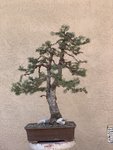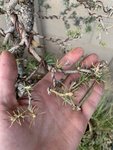You are using an out of date browser. It may not display this or other websites correctly.
You should upgrade or use an alternative browser.
You should upgrade or use an alternative browser.
Englemann spruce progression.
- Thread starter Hartinez
- Start date
Hartinez
Masterpiece
Hey Oso!! As promised. I went out just now and snapped a few shots. While I think the branches could be tweaked to fit the back as the front properly, the nebari is not at its best. Ultimately I still like the current front. I think @PiñonJ was spot on with his critique. I potted in a ceramic container too soon. While the tree is healthy, a styling in a grow box would have helped me understand the planting angle much better. I still like where I’m at with all 3 englemann I collected and can’t wait to get out and collect more! Lessons learned and the next will be better!I read through this thread and I cannot find any reason for your chosen front to not be the back instead. The other side has the proper inclination toward the viewer. That heavier branch you're worried about would be in front instead and the tree has a proper perspective when viewed from the (what is now your chosen) back.

current back

nebari back. It goes in under the base in the back a bit. You can see it in the side view.

side view

current front nebari view
Leo in N E Illinois
The Professor
- Messages
- 11,640
- Reaction score
- 24,414
- USDA Zone
- 5b
I agree that one branch on the left is too thick. Of course one option would be to remove it. The other is to control growth. Especially if you plan to allow this tree increase some in size, keep the foliage of the thick branch pruned short. Let branches below extend and grow a bit more. In time, maybe 5 years, you will notice the others becoming thicker and this overly thick branch will have not increased in diameter by much, if you were good at keeping the foliage minimal.
Hartinez
Masterpiece
I think it’s a great plan Leo. And after hearing from @wireme the angle of that branch bothers me a lot less.I agree that one branch on the left is too thick. Of course one option would be to remove it. The other is to control growth. Especially if you plan to allow this tree increase some in size, keep the foliage of the thick branch pruned short. Let branches below extend and grow a bit more. In time, maybe 5 years, you will notice the others becoming thicker and this overly thick branch will have not increased in diameter by much, if you were good at keeping the foliage minimal.
Hartinez
Masterpiece
Hartinez
Masterpiece
Hartinez
Masterpiece
Hartinez
Masterpiece
I’ve isolated it from my other englemann that just looks PHENOMENAL right now.
0soyoung
Imperial Masterpiece
Sorry, but I am of no help.@0soyoung . It’s still very much alive. It’s exhibiting what I believe are symptoms of why I mentioned above but I’d love your input. Brownish purple needles present. Lots of buds and back buds though.
As far as I know, picea like it damp/wet, so I guess it got too dry somewhere in the shuffle. I had a picea pungens in a state like your engleman and it sprang to life the following spring. Several years later I somehow drove it into a similar state, but all the buds desiccated and that was that. I've never been sure why. At that time the spruce sat near a abies lasiocarpa that I had been pushing too hard. Both cashed out that year. If it was a pathogen, it didn't spread beyond the pair that were crowded around some pines, a Japanese holly, and I can't remember what all else.
I've visited Albuquerque many times over the years. The idea of fungal problems there make me raise an eyebrow
So, I know a bunch of trivia, but nothing of any value toward getting your Englemann out of its present state.
Sorry to disappoint
The purple is anthocyanin, btw. Their basic role is to shade the photocenters (aka 'clorophylls') usually in times of hydraulic stress, aka dryness and bright sun.
Hartinez
Masterpiece
Thanks for the honesty Oso. Hoping for a turn around. piñon j seems surprised that it would be a fungal problem also being that we are high desert. I’m wondering though if it’s just movement stress. 2 moves in the last 5 months. I’ve never had so many trees struggle at one time before.Sorry, but I am of no help.
As far as I know, picea like it damp/wet, so I guess it got too dry somewhere in the shuffle. I had a picea pungens in a state like your engleman and it sprang to life the following spring. Several years later I somehow drove it into a similar state, but all the buds desiccated and that was that. I've never been sure why. At that time the spruce sat near a abies lasiocarpa that I had been pushing too hard. Both cashed out that year. If it was a pathogen, it didn't spread beyond the pair that were crowded around some pines, a Japanese holly, and I can't remember what all else.
I've visited Albuquerque many times over the years. The idea of fungal problems there make me raise an eyebrowand chortle to myself. I suppose you might living atop the Sandia Mts, but otherwise you live in a rather dry desert. I think the relative humidity is rarely above 50% there whereas it is rarely below 50% here. While Fidalgo island is basically a Douglas fir forest, there are picea sitchensis in areas that are frequently foggy. They 'like to be wet'. Engleman is its high country cousin. Blue spruce in Colorado are most frequently found on the perimeter of and in bogs.
So, I know a bunch of trivia, but nothing of any value toward getting your Englemann out of its present state.
Sorry to disappoint
The purple is anthocyanin, btw. Their basic role is to shade the photocenters (aka 'clorophylls') usually in times of hydraulic stress, aka dryness and bright sun.
here’s where my thoughts rhisphaera came from. I know its Minnesota but it seemed to match the description. onhttps://extension.umn.edu/plant-diseases/rhizosphaera-needle-cast
Similar threads
- Replies
- 11
- Views
- 1K




